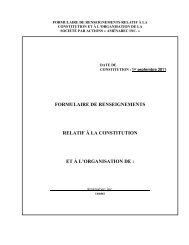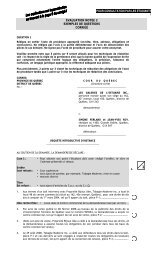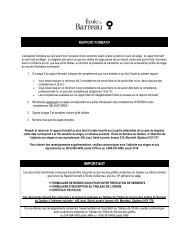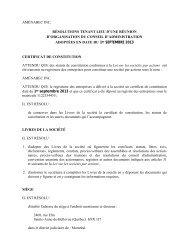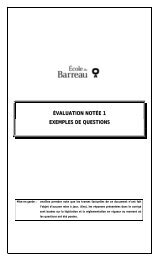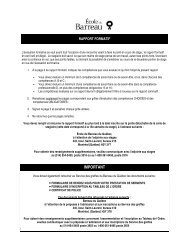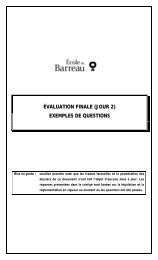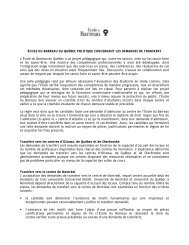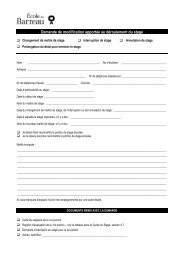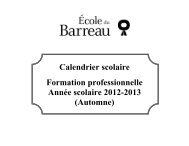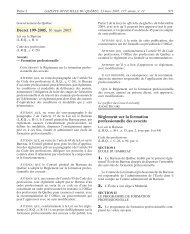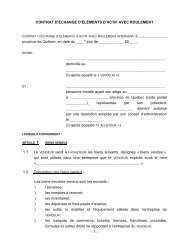graded evaluation 1 examples of questions - L'Ãcole du Barreau
graded evaluation 1 examples of questions - L'Ãcole du Barreau
graded evaluation 1 examples of questions - L'Ãcole du Barreau
Create successful ePaper yourself
Turn your PDF publications into a flip-book with our unique Google optimized e-Paper software.
GRADED EVALUATION 1<br />
EXAMPLES OF QUESTIONS<br />
Caution :<br />
please note that the fact patterns in this document have not been updated.<br />
Consequently, the answers provided in the answer key are based on the<br />
legislation and regulation in force at the time the <strong>questions</strong> were written.
2<br />
FILE 1 (6 MARKS)<br />
Example taken from Graded Evaluation 1 (autumn 2007).<br />
On June 8, 2007, Thérèse Lapensée phones M e Olivier Lamoureux’s <strong>of</strong>fice to make an appointment. A<br />
meeting is sche<strong>du</strong>led for June 12, 2007. For purposes <strong>of</strong> the meeting, Sandra Pellerin, M e Lamoureux’s<br />
secretary, takes out an old file <strong>of</strong> Thérèse Lapensée relating to proceedings involving the Régie <strong>du</strong><br />
logement. Sandra checks Thérèse Lapensée’s personal information and contact information. Given that<br />
they have not changed, Sandra gives the file to M e Lamoureux.<br />
On June 12, 2007, Thérèse goes to the meeting with two decisions rendered by the Ministère de l’Emploi et<br />
de la Solidarité sociale (aide sociale). The first decision, rendered on May 29, 2007, terminates Thérèse’s<br />
income-security benefits as <strong>of</strong> May 30, 2007, on the ground that she has been living in a de facto union with<br />
Éric Foucault for two years and has failed to declare this fact to the Ministère. The second decision,<br />
rendered on June 6, 2007, allows a claim by the Ministère for an amount <strong>of</strong> $7,000 which Thérèse received<br />
without being entitled thereto, also based on the ground <strong>of</strong> the de facto union with Éric Foucault.<br />
During the interview, Thérèse admits to M e Lamoureux that she lived with Éric, but she states that when<br />
she received the first decision, she asked Éric to leave her dwelling, and he did so. Thérèse does not<br />
understand why the Ministère is terminating her benefits, because she has no other source <strong>of</strong> income. She<br />
submits to M e Lamoureux that she should not be required to repay these sums, because she has the right to<br />
live with whomever she wants. M e Lamoureux suggests to her that she testify that Éric Foucault was a<br />
boarder, because this is the only defence available in this case.<br />
At the end <strong>of</strong> the meeting, which lasts approximately half an hour, M e Lamoureux asks his client for a $500<br />
deposit. She only has $200 in cash which she gives to M e Lamoureux. Thérèse asks about the costs this<br />
matter may entail. M e Lamoureux reassures her by telling her that he will re<strong>du</strong>ce his usual hourly rate from<br />
$200 to $140, without any further explanation.<br />
After Thérèse’s departure, M e Lamoureux sends the applications for review <strong>of</strong> the two decisions in which he<br />
formally requests a date for a conference call <strong>du</strong>ring which he will present his observations orally.<br />
M e Lamoureux files the documents in the file folder his secretary had given him. He fills out the client card<br />
and, on his deposit slip, adds the amount <strong>of</strong> $200 remitted by Thérèse to the fees received from his other<br />
clients; later that same day, he makes the deposit into his general account.<br />
On June 18, 2007, the revising <strong>of</strong>ficer in charge <strong>of</strong> the case contacts M e Lamoureux and a conference call<br />
is sche<strong>du</strong>led for July 4, 2007, because M e Lamoureux will not be available before this date. M e Lamoureux<br />
notifies his client about the date <strong>of</strong> the conference call and asks Sandra to record this date only in<br />
Thérèse Lapensée’s file, without writing it in his agenda.<br />
On June 29, 2007 Sandra takes out Thérèse Lapensée’s file so that M e Lamoureux can prepare for the<br />
conference call on July 4, 2007. However, he is very busy that day and does not review his client’s file<br />
until July 3, 2007.<br />
On July 3, 2007, without contacting Thérèse, M e Lamoureux phones the revising <strong>of</strong>ficer and tells him that<br />
his client is not feeling well and that the conference call will have to be postponed. A new conference<br />
call is sche<strong>du</strong>led for July 25, 2007, because M e Lamoureux will be on vacation from July 11 to<br />
July 19, 2007. On July 3, 2007, he contacts his client to inform her that the revising <strong>of</strong>ficer cannot<br />
proceed before July 25, 2007. Thérèse is disappointed because she still has no income.
3<br />
On July 4 and 5, 2007, M e Lamoureux checks the law and carries out doctrinal and jurisprudential research<br />
in Thérèse’s file. He then prepares an invoice which he sends to his client on July 5, 2007. He sets aside<br />
the file until July 20, 2007.<br />
On July 9, 2007, Thérèse receives a detailed invoice for pr<strong>of</strong>essional services rendered by M e Lamoureux<br />
to date and is surprised to see a balance owing <strong>of</strong> $600. She immediately calls M e Lamoureux’s <strong>of</strong>fice, but<br />
he refuses to take the call and asks Sandra to say that he is in court and will call her back later. On<br />
July 10, 2007, M e Lamoureux is at his <strong>of</strong>fice, but he is dealing with his urgent cases, because he has to<br />
leave on vacation the next day, and does not have the time to call Thérèse regarding the invoice.<br />
On July 23, 2007, Thérèse once again calls M e Lamoureux to complain about the invoice. He tells Thérèse<br />
that he did the work and that if she does not pay him by July 24, 2007, she will have to find another<br />
lawyer or handle the conference call sche<strong>du</strong>led for July 25, 2007 on her own. Given that Thérèse is<br />
unable to borrow the necessary amount to pay M e Lamoureux’s invoice and does not find another lawyer,<br />
she represents herself <strong>du</strong>ring the conference call on July 25, 2007.<br />
QUESTION 1<br />
State NINE breaches <strong>of</strong> the rules <strong>of</strong> ethics and pr<strong>of</strong>essional practice committed by M e Olivier<br />
Lamoureux. For each breach, justify your answer by referring:<br />
(a)<br />
(b)<br />
to the specific facts contained in the fact pattern;<br />
to one or more specific and relevant legislative or regulatory provisions.<br />
Please note that 1 mark out <strong>of</strong> 6 marks will be awarded to students who have not added any<br />
irrelevant or incorrect breach.
4<br />
FILE 2 (3 MARKS)<br />
Example taken from Graded Evaluation 1 (winter 2010).<br />
In June 2000, M e Nicholas Walter acted as family mediator for Mona Bond and Philippe Robinson. On July<br />
10, 2000, M e Walter drafted a summary <strong>of</strong> the agreements entered into as a result <strong>of</strong> the mediation. That<br />
same day, M e Walter had Mona and Philippe sign the affidavits annexed to the joint application for divorce<br />
which sought, among other things, to give Mona custody <strong>of</strong> her two children, Daphnée and Raphaël, who<br />
were then 1 and 3 years old, and to establish the support payments for Daphnée and Raphaël. The motion<br />
was presentable on August 24, 2000 in the Superior Court case number 500-12-001001-001. On August 24,<br />
2000, M e Suzanne Touché, in her capacity as special clerk, rendered a judgment and confirmed the<br />
consent signed by the parties.<br />
On December 3, 2009, M e Walter, acting on behalf <strong>of</strong> Philippe Robinson in the Superior Court case number<br />
500-12-001001-001, prepares an application for custody <strong>of</strong> the children, cancellation <strong>of</strong> the support<br />
payments and an interim order. The motion is presentable on January 19, 2010. On December 16, 2009,<br />
M e Jeanne Mazza, Mona Bond’s new lawyer, contacts M e Walter and informs him that she is <strong>of</strong> the opinion<br />
that he is in a situation <strong>of</strong> conflict <strong>of</strong> interests; according to her, he cannot represent Philippe, because he<br />
previously acted as mediator between Philippe and her client Mona and, moreover, he prepared the joint<br />
application for divorce at the time <strong>of</strong> the July 2000 proceedings.<br />
M e Walter informs M e Mazza that the December 3, 2009 motion deals with entirely new facts and a very<br />
different situation: he explains that, since the judgment granting Mona custody, the children have never<br />
in fact lived with her. He tells M e Mazza that he believes that the fact that he acted as mediator and<br />
prepared the written proceedings in accordance with the agreements entered into <strong>du</strong>ring the mediation<br />
does not automatically create a situation <strong>of</strong> conflict <strong>of</strong> interests. Furthermore, given that he has a thriving<br />
practice and given that since the year 2000 he has handled hundreds <strong>of</strong> family law cases, he does not<br />
remember this case in particular. According to him, he can most certainly represent Philippe.<br />
QUESTION 2<br />
Is M e Nicholas Walter right in stating that he can continue to represent Philippe Robinson with respect<br />
to the December 3, 2009 motion? Give reasons for your answer and refer to the specific facts<br />
contained in the fact pattern as well as to one or more specific and relevant legislative provisions.
5<br />
FILE 3 (6 MARKS)<br />
Example taken from Graded Evaluation 1 (autumn 2006).<br />
The situation described in file 3 is an evolving one: all the supplementary facts are to be added to the<br />
main portion <strong>of</strong> the fact pattern to form part there<strong>of</strong>.<br />
Ryan Leclerc, the principal shareholder and director <strong>of</strong> the hardware store ABC inc., received a motion to<br />
institute proceedings instituted by one <strong>of</strong> its suppliers, Matériaux Toutépreuve inc., which is asking for the<br />
cancellation <strong>of</strong> a contract and the payment <strong>of</strong> damages <strong>du</strong>e to illegal and abusive clauses.<br />
Ryan gives M e Julie Bonsecours the mandate to represent the company. In the course <strong>of</strong> preparing the<br />
defence, M e Bonsecours analyzes the various elements <strong>of</strong> the motion and sche<strong>du</strong>les a meeting at Ryan’s<br />
<strong>of</strong>fice in order to obtain relevant information. During the meeting, M e Bonsecours asks <strong>questions</strong> regarding<br />
the company’s financial and accounting matters. Although Ryan is able to provide some answers to these<br />
<strong>questions</strong>, it is necessary for Simone Dupuis, an employee in the accounting department <strong>of</strong> the hardware<br />
store ABC inc., to attend the meeting in order to explain the various proce<strong>du</strong>res that exist and answer the<br />
lawyer’s <strong>questions</strong>.<br />
During this meeting to prepare for the trial, M e Bonsecours decides to have Sophie Allard, a good customer<br />
<strong>of</strong> the hardware store ABC inc., testify. However, M e Bonsecours learns that Sophie will be on vacation at<br />
the time <strong>of</strong> the trial. She therefore decides to <strong>of</strong>fer Sophie an amount <strong>of</strong> $100, in addition to the amounts<br />
that will be paid to her by law, in order to compensate her for the loss <strong>of</strong> one day <strong>of</strong> vacation.<br />
QUESTION 3<br />
Does M e Julie Bonsecours’s <strong>of</strong>fer constitute a breach <strong>of</strong> her ethical obligations? Give reasons for your<br />
answer and refer to the specific facts contained in the fact pattern as well as to one or more specific<br />
and relevant legislative provisions.<br />
SUPPLEMENTARY FACTS<br />
The day <strong>of</strong> the trial arrives. At the beginning <strong>of</strong> the hearing, M e Louis Savaria, the lawyer for Matériaux<br />
Toutépreuve inc., announces that he will call three witnesses, namely two representatives <strong>of</strong> his client as<br />
well as Daniel Hétu, a former employee <strong>of</strong> the hardware store ABC inc. Ryan is very surprised to learn that<br />
Daniel Hétu will testify at the trial.<br />
The first day <strong>of</strong> the hearing ends and the case is adjourned to the following day. It will begin with the<br />
testimony <strong>of</strong> Mr. Hétu. M e Bonsecours drives her client to his home and uses the occasion to review the first<br />
day <strong>of</strong> the hearing and prepare a strategy for the rest <strong>of</strong> the trial. Ryan, who is visibly angry, states that he<br />
is certain that it is Daniel Hétu who is causing him all these legal problems. He raises his voice and declares<br />
that Daniel is an ungrateful person. Ryan, who is getting angrier and angrier, bangs his fist, yells louder and<br />
states that he will teach him to keep his mouth shut and will make sure that he regrets his actions. He says<br />
that he knows just the person to take care <strong>of</strong> this. M e Bonsecours, who has been working with Ryan for more<br />
than three years, has never seen her client in such a state. She tries to calm him down, but is unable to do<br />
so. She drops <strong>of</strong>f Ryan at his home and goes to the <strong>of</strong>fice to prepare for the second day <strong>of</strong> the hearing. She is<br />
shaken by her client’s statements and fears for the safety <strong>of</strong> Daniel Hétu.<br />
QUESTION 4<br />
Must M e Julie Bonsecours disclose to the appropriate authorities what Ryan Leclerc confided to her?<br />
Give reasons for your answer and refer to the specific facts contained in the fact pattern as well as to<br />
one or more specific and relevant legislative provisions.
6<br />
SUPPLEMENTARY FACTS<br />
During the second day <strong>of</strong> the hearing, under cross-examination, M e Savaria asks Simone Dupuis, the<br />
employee in the accounting department <strong>of</strong> the hardware store ABC inc., to repeat what she stated <strong>du</strong>ring<br />
the meeting organized by M e Bonsecours to prepare the defence.<br />
QUESTION 5<br />
Is there an objection that M e Julie Bonsecours can raise? Give reasons for your answer and refer to the<br />
specific facts contained in the fact pattern as well as to one or more specific and relevant legislative<br />
provisions.



